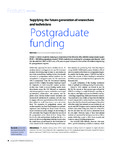Postgraduate Funding - supplying the future generation of researchers and technicians
| dc.contributor.author | Fuller, Michael | |
| dc.date.accessioned | 2014-08-05T21:45:37Z | |
| dc.date.accessioned | 2014-08-05T21:46:22Z | |
| dc.date.available | 2014-08-05T21:45:37Z | |
| dc.date.available | 2014-08-05T21:46:22Z | |
| dc.date.issued | 2014-08-05 | |
| dc.identifier.uri | http://hdl.handle.net/10026.1/3061 | |
| dc.description.abstract |
Of the 2.5 million students studying at universities in the UK some 30% [500000 postgraduate taught (PGT) + 100000 postgraduate research (PGR) students] are studying for a postgraduate degree, and the decade from 2001 to 2011 saw a 7% year-on-year increase in the number of students registering for postgraduate degrees. Within this expansion has been a healthy rise in UK students, but an even bigger rise in non-UK (overseas) students which bring large revenues to universities on top of the normal home funding. In fact, this decadal expansion in postgraduate student numbers was an unregulated or uncapped market for UK universities with a commitment from the Government funding agency [HEFCE (Higher Education Funding Council for England)] to fund home/EU student numbers as they rose. Under a secure funding model, many departments across the UK followed an expansion route for postgraduate degrees, and this has encouraged specialization, collaboration with industry and the public sector, and has fuelled research ambitions and increased job satisfaction for academic staff who want to engage with more specialization at the forefront of their subject in small class sizes or on a one-to-one basis. The expansion in postgraduate courses and student numbers has been based largely on academic arguments since funding was always secure. However, recent Government policy changes on the funding of UK universities have begun to threaten the security of the postgraduate sector. | |
| dc.format.extent | 8-11 | |
| dc.language | English | |
| dc.language.iso | English | |
| dc.publisher | The Biochemical Society | |
| dc.relation.replaces | http://hdl.handle.net/10026.1/3060 | |
| dc.relation.replaces | 10026.1/3060 | |
| dc.title | Postgraduate Funding - supplying the future generation of researchers and technicians | |
| dc.type | journal-article | |
| dc.type | Article | |
| plymouth.volume | 36 (4) | |
| plymouth.publisher-url | http://www.biochemist.org/bio/default.htm | |
| plymouth.journal | The Biochemist | |
| plymouth.organisational-group | /Plymouth | |
| plymouth.organisational-group | /Plymouth/Faculty of Science and Engineering | |
| plymouth.organisational-group | /Plymouth/REF 2021 Researchers by UoA | |
| plymouth.organisational-group | /Plymouth/REF 2021 Researchers by UoA/UoA06 Agriculture, Veterinary and Food Science | |
| plymouth.organisational-group | /Plymouth/Users by role | |
| plymouth.organisational-group | /Plymouth/Users by role/Academics | |
| dcterms.dateAccepted | 2014-01-01 | |
| dc.rights.embargodate | 2023-9-29 | |
| dc.rights.embargoperiod | Not known | |
| rioxxterms.licenseref.uri | http://www.rioxx.net/licenses/all-rights-reserved | |
| rioxxterms.type | Journal Article/Review |


